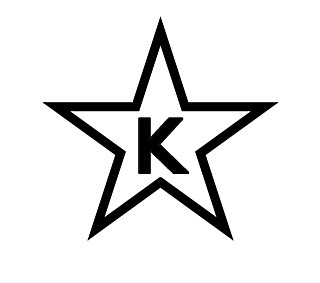Halakha, also transliterated as halacha, halakhah, and halocho, is the collective body of Jewish religious laws that are derived from the Written and Oral Torah. Halakha is based on biblical commandments (mitzvot), subsequent Talmudic and rabbinic laws, and the customs and traditions which were compiled in the many books such as the Shulchan Aruch. Halakha is often translated as "Jewish law", although a more literal translation of it might be "the way to behave" or "the way of walking". The word is derived from the root which means "to behave". Halakha not only guides religious practices and beliefs, it also guides numerous aspects of day-to-day life.
Kashrut is a set of dietary laws dealing with the foods that Jewish people are permitted to eat and how those foods must be prepared according to Jewish law. Food that may be consumed is deemed kosher, from the Ashkenazi pronunciation of the term that in Sephardic or Modern Hebrew is pronounced kashér, meaning "fit". Food that may not be consumed, however, is deemed treif, also spelled treyf.

Rabbinic literature, in its broadest sense, is the entire spectrum of rabbinic writings throughout Jewish history. However, the term often refers specifically to literature from the Talmudic era, as opposed to medieval and modern rabbinic writing, and thus corresponds with the Hebrew term Sifrut Chazal. This more specific sense of "Rabbinic literature"—referring to the Talmudim, Midrash, and related writings, but hardly ever to later texts—is how the term is generally intended when used in contemporary academic writing. The terms mefareshim and parshanim (commentaries/commentators) almost always refer to later, post-Talmudic writers of rabbinic glosses on Biblical and Talmudic texts.

The Mishnah Berurah is a work of halakha by Rabbi Yisrael Meir Kagan. It is a commentary on Orach Chayim, the first section of the Shulchan Aruch which deals with laws of prayer, synagogue, Shabbat and holidays, summarizing the opinions of the Acharonim on that work.

The Mishneh Torah, also known as Sefer Yad ha-Hazaka, is a code of Rabbinic Jewish religious law (halakha) authored by Maimonides. The Mishneh Torah was compiled between 1170 and 1180 CE, while Maimonides was living in Egypt, and is regarded as Maimonides' magnum opus. Accordingly, later sources simply refer to the work as "Maimon", "Maimonides", or "RaMBaM", although Maimonides composed other works.

Religious Zionism is an ideology that views Zionism as a fundamental component of Orthodox Judaism. Its adherents are also referred to as Dati Leumi, and in Israel, they are most commonly known by the plural form of the first part of that term: Datiim. The community is sometimes called 'Knitted kippah', the typical head covering worn by male adherents to Religious Zionism.

A mashgiach or mashgicha is a Jew who supervises the kashrut status of a kosher establishment. Mashgichim may supervise any type of food service establishment, including slaughterhouses, food manufacturers, hotels, caterers, nursing homes, restaurants, butchers, groceries, or cooperatives. Mashgichim usually work as on-site supervisors and inspectors, representing a kosher certification agency or a local rabbi, who actually makes the policy decisions for what is or is not acceptably kosher. Sometimes certifying rabbis act as their own mashgichim; such is the case in many small communities.
Kosher foods are foods that conform to the Jewish dietary regulations of kashrut. The laws of kashrut apply to food derived from living creatures and kosher foods are restricted to certain types of mammals, birds and fish meeting specific criteria; the flesh of any animals that do not meet these criteria is forbidden by the dietary laws. Furthermore, kosher mammals and birds must be slaughtered according to a process known as shechita and their blood may never be consumed and must be removed from the meat by a process of salting and soaking in water for the meat to be permissible for use. All plant-based products, including fruits, vegetables, grains, herbs and spices, are intrinsically kosher, although certain produce grown in the Land of Israel is subjected to other requirements, such as tithing, before it may be consumed.
Negiah, literally "touch", is the concept in Jewish law (Halakha) that forbids or restricts sensual physical contact with a member of the opposite sex except for one's spouse, outside the niddah period, and certain close relatives to whom one is presumed not to have sexual attraction. A person who abides by this halakha is colloquially described as a shomer negiah.

Orach Chayim, is a section of Rabbi Jacob ben Asher's compilation of Halakha, Arba'ah Turim. This section addresses aspects of Jewish law pertinent to the Hebrew calendar. Rabbi Yosef Karo modeled the framework of the Shulkhan Arukh, his own compilation of practical Jewish law, after the Arba'ah Turim. Many later commentators used this framework, as well. Thus, Orach Chayim in common usage may refer to another area of halakha, separate from Rabbi Jacob ben Asher's compilation.

Avodah Zarah is the name of a tractate of the Talmud, located in Nezikin, the fourth Order of the Talmud dealing with damages. The main topic of the tractate is laws pertaining to Jews living amongst Gentiles, including regulations about the interaction between Jews and "avodei ha kochavim", which literally interpreted is "Worshipers of the stars", but is most often translated as "idolaters", "pagans", or "heathen."
Bishul Yisrael is a Hebrew term for one of the laws of kashrut in Judaism. The rule prohibits eating certain foods if they are cooked exclusively by non-Jews. The term is the opposite of bishul akum, which the rule forbids. Akum (עכו"ם) is an acronym of Ovdey Kochavim U'Mazalot, literally "worshippers of stars and zodiac signs", but is actually a term for non-Jews).
Jewish heresy refers to those beliefs which contradict the traditional doctrines of Rabbinic Judaism, including theological beliefs and opinions about the practice of halakha. Jewish tradition contains a range of statements about heretics, including laws for how to deal with them in a communal context, and statements about the divine punishment they are expected to receive.

Star-K Kosher Certification, also known as the Vaad Hakashrut of Baltimore, is a kosher certification agency based in Baltimore, Maryland, under the administration of Rabbi Moshe Heinemann, with the involvement of many other rabbis. It is one of the largest Jewish dietary certification agencies in North America. It is trusted by many Orthodox Jews worldwide for dedication to preserving Kashrut. The organization supervises tens of thousands of commercial food products and food establishments around the world.
Shituf is a term used in Jewish sources for the worship of God in a manner which Judaism does not deem to be purely monotheistic. The term connotes a theology that is not outright polytheistic, but also should not be seen as purely monotheistic. The term is primarily used in reference to the Christian Trinity by Jewish legal authorities who wish to distinguish Christianity from full-blown polytheism. Though a Jew would be forbidden from maintaining a shituf theology, non-Jews would, in some form, be permitted such a theology without being regarded as idolaters by Jews. That said, whether Christianity is shituf or formal polytheism remains a debate in Jewish philosophy.

Sifrei Kodesh, commonly referred to as sefarim, or in its singular form, sefer, are books of Jewish religious literature and are viewed by religious Jews as sacred. These are generally works of Torah literature, i.e. Tanakh and all works that expound on it, including the Mishnah, Midrash, Talmud, and all works of halakha, Musar, Hasidism, Kabbalah, or machshavah. Historically, sifrei kodesh were generally written in Hebrew with some in Judeo-Aramaic or Arabic, although in recent years, thousands of titles in other languages, most notably English, were published. An alternative spelling for 'sefarim' is seforim.
In Jewish law, a posek is a legal scholar who determines the application of halakha, the Jewish religious laws derived from the written and Oral Torah in cases of Jewish law where previous authorities are inconclusive, or in those situations where no clear halakhic precedent exists.
The following outline is provided as an overview of and topical guide to Judaism:

Kiddushin is a masekhet or tractate of the Mishnah and the Talmud, and is part of the order of Nashim. The content of the tractate primarily deals with the legal provisions related to halakhic engagement and marriage.











